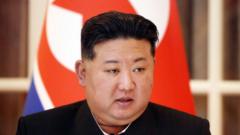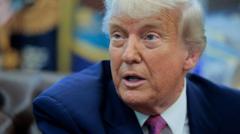Amid escalating tensions, North Korea has criticized the US's ambitious "Golden Dome" defense initiative, warning that it could lead to a nuclear arms race in space.
North Korea Warns US 'Golden Dome' Could Trigger Space Nuclear Conflict

North Korea Warns US 'Golden Dome' Could Trigger Space Nuclear Conflict
Pyongyang denounces Trump's missile shield plans as a threat to global security
North Korea has voiced strong opposition to the United States' proposed "Golden Dome" missile defense system, labeling it a catalyst for a potential "space nuclear war." Announced by President Donald Trump, the system aims to counter advanced aerial threats, including both ballistic and cruise missiles.
In sharp tones reported by state media, North Korea's foreign ministry condemned the initiative as an exercise in "self-righteousness and arrogance." They accused the US of intent to "militarize outer space" and warned that this endeavor might ignite a "global nuclear and space arms race." The North perceives the Golden Dome as a significant threat, as it could potentially undermine its nuclear capabilities, prompting a response in terms of alternate military developments.
Analyst Hong Min from the Korea Institute for National Unification has noted that this could compel North Korea to explore new methods to counteract US defenses. The North claimed in recent months that it successfully tested an intermediate-range ballistic missile equipped with a hypersonic warhead, asserting its aim to firmly secure its position in the Pacific.
North Korea's disapproval echoes sentiments from China, which has also expressed concerns regarding the implications of the Golden Dome project, describing it as having "strong offensive capabilities." China's foreign ministry criticized the US for its "US-first" policy, suggesting it undermines global security and stability.
Many experts recognize the need for an updated US missile defense architecture but caution against the potential financial and political hurdles associated with the Golden Dome's development. With an initial funding proposal of $25 billion in a forthcoming budget bill, projections indicate that the ultimate cost could escalate dramatically over time, severely impacting the US defense spending landscape.





















